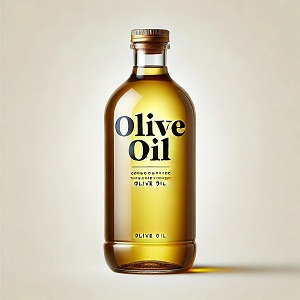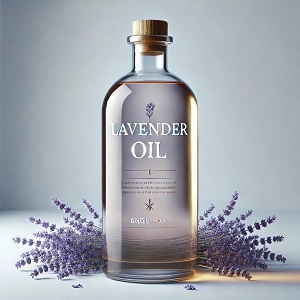Saffron Oil
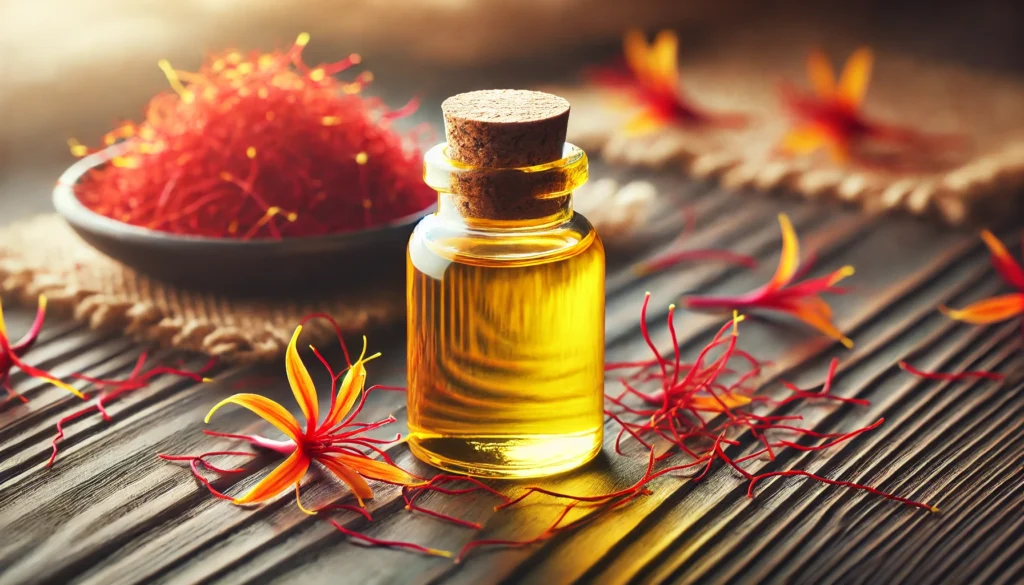
Saffron oil, extracted from the bright red stigmas of the Crocus sativus flower, is a luxurious yet expensive oil with numerous advantages, as mentioned below.
Saffron oil, also known as “liquid gold,” has been used for centuries in various traditions and is connected with health benefits and beauty uses. Saffron oil has a delicate scent and a rich ingredient list, which makes it great for use in the natural wellness/ beauty sector. In addition to its lovely aroma, this oil is full of potent antioxidants and other bioactive compounds in holistic medicine.
Table of Contents
This structure organizes the information to cover all aspects of saffron oil, from its history and benefits to usage guidelines and safety considerations.
| Introduction to Saffron Oil Historical and Cultural Significance of Saffron Traditional Uses of Saffron in Medicine Extraction of Saffron Oil Global Production and Export of Saffron Oil Health Benefits of Saffron Oil Saffron Oil for Skin and Hair Uses of Saffron Oil How to Use Saffron Oil Safely Side Effects and Precautions Frequently Asked Questions about Saffron Oil Conclusion |
History and Culture
Saffron in history and culture
Since ancient times, saffron has been prominent in different cultures. Venice is legendary but well-traveled, and Sir Elton John once claimed one could buy the whole town for a pound of saffron (he also said Venice was like eating an entire boxful of chocolate liqueurs in one go).
Back to Stellenbosch: Not surprisingly, in Sumeria in 2000 BC or further northwest from Persia into Jerusalem, Egypt had Pharaohs through Rome, savoring lifeblood immediately with this spice.
With its golden appearance and unique scent, it was a sought-after product that could be sold for thousands of dollars as far upstream along the Silk Road while being in high demand to use on religious tools, dyes, and perfumes. Initially used in Indian and Middle Eastern healing rituals, saffron was more valuable than gold by weight during medieval Europe.
This historic cultural admiration for saffron remained since time immemorial, and its wonder has survived the contemporary times.
Role of Saffron in Home Remedies and Traditional Medicine.
Since millennia, saffron has been an integral part of traditional medicine, especially in Ayurveda and Persian medicine. This natural remedy has been a go-to for thousands of years, helping cure everything from digestive issues to mood swings. A favorite of ancient healers for its relaxation benefits in cases of stress and anxiety or depression, saffron is adorned with its calming abilities. It also aids reproductive health, promotes better eyesight, and helps memory
. Modern research has solidly proven the medicinal properties of saffron, including powerful anti-inflammatory and antioxidant effects and protective benefits for neurological health.
Saffron Oil Extraction and its Role in Alternative Medicine
The minute quantity of oil produced by several thousand saffron threads during extraction ensures that it is one of the most precious and expensive essential oils. Cold-press extraction ensures that the active components within the oil retain their maximum potency.
The result is that the highest quality oils are highest in safranal, crocin, and picrocrocin…three elements making the essential oil such great medicine! Traditionally, saffron oil is used in alternative medicine for a few key reasons: to alleviate inflammation, maintain skin health, and improve mental states. Holistic therapies have increasingly been where the solution lies for many who suffer from symptoms of anxiety, cannot sleep, and experience beauty conditions such as eczema.
The Extraction of Saffron Oil

Saffron oil is just as delicate and intricate as most things with saffron. Because the threads of saffron come from little stigmas on Crocus sativus blooms, it takes an astonishing number of these flowers even to make a drop of oil.
The extracted threads are collected, and after hand picking one by one ( to extract those long mature ones ), which must be carefully so that the quality is maintained, a drying process begins before extraction starts. It is a product of one of the most precious essential oils in the world and has a high price. It is a concentrated oil that preserves the characteristic color, smell, and, of course, its properties.
Extraction techniques of the past and present
Believe it or not, saffron oil is an infusion, which refers to simmering (steeping) strands in another liquid, usually olive oil or almond. The injection is less potent, but the long time it sits with saffron gives the active compounds of this food plenty enough opportunity to mix with our oil.
Nonetheless, as in other fields of industry, modernization has brought new and more advanced effects—such as cold-press extraction. This technique presses saffron using mechanical pressure, not heat, to maintain the most active compounds (safranal and crocin).
Cold-pressing is the only way to ensure an utterly unadulterated oil, and it preserves all of the saffron’s healing actions. Thus, top-quality edible or skin massage-grade pure Saffron Oil is made.
Problems of Saffron Oil Extraction
Saffron Oil Extraction: Beyond Difficult Harvest, Saffron oil extraction is even more demanding than harvesting saffron. The problem is that a considerable amount of saffron extract oil. The relative rarity of the crop and the delicate stigma also cause high production costs. On the other hand, preserving saffron oil extract quality and power during extraction is also tricky, as saffron compounds are susceptible to heat and light.
Top Exporter Countries of Saffron Oil
Saffron Oil is rare; few countries have the climate, expertise, and resources to cultivate saffron at a large scale. These countries influence this spice’s global production and commerce, adding value to its precious oil.
Iran – The Greatest Saffron Producing Country
Iran Saffron is a premium saffron produced in Iran, the biggest producer (more than 90% globally). Its unusual climate, which involves dry summers and mild winters, lends well to growing saffron.
Khorasan is where the world’s highest grade of saffron is growing. Iranian saffron, reputed for its quality color, taste, and active compounds, is the primary source of extra pure saffron oil. With the saffron industry deeply ingrained in Iran and its cultural heritage, generations have learned traditional harvesting techniques.
Today, Iran exports saffron and safflower, both as spices and essential oils, to many countries around the world.
The significance of Saffron production for Spain and India
While Iran is the top producer and exporter of saffron, Spain and India represent two critical locations for its production. Spain has a strong tradition of farming and exporting this valuable spice—La Mancha saffron is very famous. Spanish saffron is a premium product (especially for consumption), and Spain continues to be one of the top exporters of saffron oil in Europe and across oceans.
On the other hand, Kashmiri saffron grown in India is well known for its rich color and aroma. Even though it produces much less than Iran, Kashmiri saffron is regarded as one of the best types, making it ideal for the premium Saffron Oil market.
Saffron Oil Market View for the Rest of the World
Saffron oil’s global market demand is increasing due to its applications in expanding beauty, wellness, and culinary industries. It is one of the world’s most coveted and expensive essential oils, used in the highest-end skin care products, perfumes, and gourmet food items imported by countries such as the USA to the Middle East or various European nations.
The high cost of labor-intensive harvesting (the amount made from each painstakingly hand-picked bloom is minuscule, which leads to one pound offset by 200,000 stigmas) keeps prices relatively lofty and the spice a luxury good in most markets.
However, the subsequent increase in demand for natural and organic products ensured the growth of the global saffron oil market on a parallel level as consumers have become more sensible towards benefits that are unique to health and beauty from application or consumption.
Benefits of Red Gold
Benefits Of Saffron Oil For Health.
Saffron oil is not just a precious essential oil combined with myriad health-beneficial compounds. It is a therapeutic agent with antioxidant properties and is effective in mental health; thus, it was for medicinal purposes in the Old World.
It is Antioxidant Properties
Another of the most famous benefits of saffron oil is that it has a large amount of antioxidants. Saffron has crocin, safranal, and picrocrocin compounds, which are antioxidants. These antioxidants are responsible for counteracting oxidative stress, a critical player in the aging process and onset of chronic diseases. , saffron oil contributes to cellular health overall, decreasing inflammation and reducing the risks for many other chronic diseases like heart disease and cancer.
Immune System Support
The other benefit is that saffron oil can also assist the immune system. As an antioxidant and anti-inflammatory, it activates the body’s natural defense mechanisms.
When taken regularly as a part of the diet or applied to wounds and injuries, saffron oil helps prevent infections, decreases inflammation levels in the body (both internally inside all cells and externally), and increases the rate by which burns or lacerations heal.
Saffron is also an energizer, which can boost energy levels and stamina, providing excellent support for immune health overall.
Skin And Hair Health
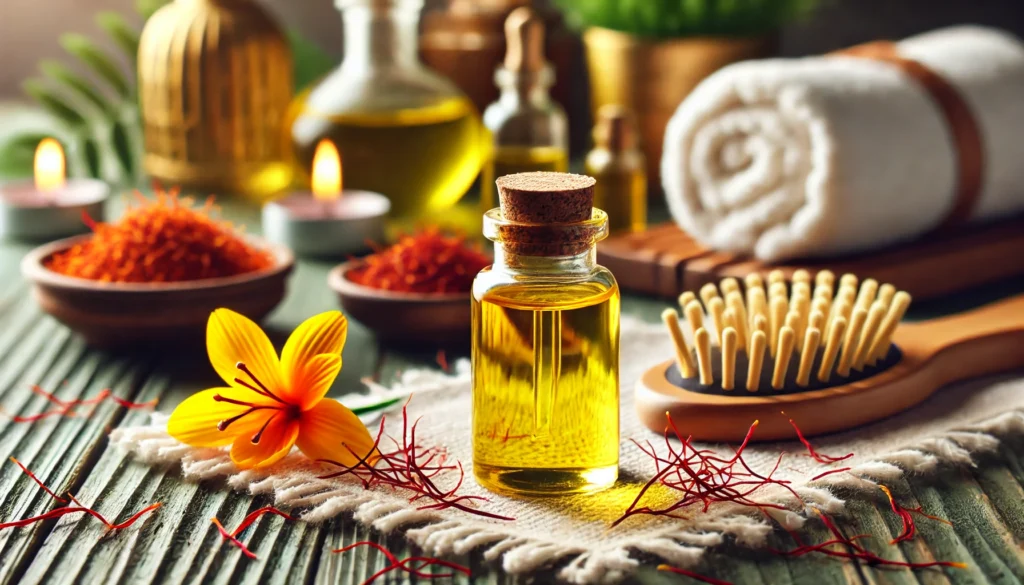
As an ingredient in skincare products and hair oils, saffron has gained immense popularity owing to its nourishing properties, which can rejuvenate the entire system.
Saffron oil soothes cracked skin, enhances blood circulation, and provides extreme nourishment. It can be part of the skincare regimen since its antioxidants protect the skin from exposure, reduce damage, and improve evenness. It helps to strengthen follicles, treats hair loss and makes the hair stronger and shinier.
It also has anti-inflammatory properties, so it is excellent for calming scalp irritation and fighting back dandruff.
EFFECTS ON THE NERVOUS SYSTEM AND MOOD
Saffron is an aromatic and mood-altering plant that increases dopamine levels in the brain, which can reduce anxiety. In Oriental medicine, saffron has been used for centuries as a natural cure against depression, anxiety, and sleeplessness.
Today, these uses by modern studies suggest that saffron oil helps balance the neurotransmitters in our brain, such as serotonin (linked to well-being and happiness). It is a fantastic option if stress, nervous tension, or sleep disturbances affect health. Since saffron oil can lower stress levels and promote relaxation, it benefits mental and emotional health.
Saffron Oil and Skincare
With several benefits to the complexion and aiding in skin concerns, saffron oil is becoming increasingly recognized as an ingredient boasting powerful skincare properties. Full of antioxidants and vital nutrients, saffron oil is one the most effective skin care products used in maintaining healthy skin.
Skin Hydration and Lightening
Why Is Saffron Oil a Good Moisturizer for the Skin? It is a natural moisturizer that helps retain moisture and prevent dryness. The oil is quickly absorbed and only requires a few minutes before it feels perfectly soft, non-sticky skin. Not only is saffron oil moisturizing, but the oil also helps brighten skin. It can fade dark spots and pigmentation so the skin looks more even in tone, with a brighter glow over time.
Combat Wrinkles and Aging Signs
Saffron oil is a powerful supporter in battling wrinkles and aging signs. The more potent antioxidants it contains, like crocin and safranal, help counteract the activity of free radicals in our bodies that cause skin aging. When used regularly, Saffron oil reduces fine lines and wrinkles, making skin look healthy and firm. Furthermore, saffron oil helps in collagen production, essential for the skin to keep it elasticized and look young. It makes them an ideal ingredient for those who want to age well while maintaining a facelift.
Treating Skin Inflammation
Saffron oil also has an anti-inflammatory action and is a great way to calm down inflamed or irritated skin. It can be beneficial in soothing redness, reducing inflammation, and helping conditions like eczema, acne, or rosacea heal. It is also an excellent option for healing small incisions, wounds, or skin infections naturally.
The anti-inflammatory properties of saffron oil provide quick relief by healing the skin while reducing irritation and redness. It is a universal ingredient that greatly benefits skincare routines and is suitable for all sensitive or reactive skin.
Original Saffron Oil Uses
Saffron oil has long for its healthful attributes and multitudinous applications in medicine and cuisine. Its history, which spans several colorful cultures and cuisines, dates back to traditional remedies or as a wealthy ingredient in cooking.
Medicine Health
In Traditional Medicine
Saffron oil has long been used in traditional medicine to address several conditions. It has also been used in Ayurvedic and Persian medicine to treat digestive complaints and mood disorders. The soothing effect of Saffron oil made it a worldwide famous medicine for relief from anxiety, tension, and depression.
Healers prescribed saffron essential oil to aid mental clarity, relaxation, and sleep better, as well as increase libido. Besides that, saffron oil alleviates pain topically and lowers muscle and joint inflammation. Oatmeal is also helpful in calming irritated skin conditions like eczema and psoriasis due to its anti-inflammatory and antioxidant properties and its ability to treat minor wounds or infections. Due to its therapeutic properties, different cultures have used saffron oil in various natural healing practices.
In Cooking and Cuisine
Saffron oil has another application: it is becoming a popular ingredient in kitchens worldwide for its taste and beautiful red-orange hue. Saffron is a well-known spice, but saffron oil makes an aromatic and flavorful substitute in many dishes. A few drops of saffron oil can give rice, stews, soups, and even desserts an intriguing golden hue and gentle but earthy taste.
Saffron oil is used sparingly because if it overpowers the dish, the whole flavor of finely cooked food will be ruined for marinades and a finishing oil in Moroccan cuisine, significantly often with chicken or fish. In addition to this culinary use, saffron oil is in food applications for its purported health benefits. To help increase digestion and appetite, it is more than just a tasty addition; it is a feature ingredient in traditional dishes.
How to Use Saffron Oil
Benefits: Saffron oil is suitable for internal and external use. Ingredient Types Since it is so strong, one must know how to use it properly to obtain this potential upside.
Internal Uses and Recommended Dosages
Use saffron oil sparingly when it is for internal consumption because this oil is too potent and concentrated. Please do not take anything in excess; enough 3–4 drops of saffron oil for general health benefits. It can stir collagen in herbal tea, raw milk, and cold smoothies—Saffron oil in perfumes and cosmetics as a natural skin care treatment. However, traditional medicine still contains benefits for the support of mood improvement or digestive health issues.
These are in very low doses, usually between 1-3 drops daily. As with any other source of essential oils, they should speak to a health professional first if they are pregnant or breastfeeding. Saffron oil is powerful, so moderation to avoid adverse side effects.
Topical Use for Skin and Hair
Saffron oil is decidedly precious for its many topical perks for skin and hair. Diluted saffron oil with carrier oils such as jojoba, almond, or argan to make an excellent moisturizing blend for skincare and thus brighten skin tone. Moreover, people can also mix a few drops of saffron oil in their everyday moisturizer/face serum for excellent results.
Once prepared for consumption, saffron is in fantastic shape and is a hair-growth oil. Add a few drops in a carrier oil like coconut or olive oil and apply it to the scalp.
Apply and leave it on for 30 minutes to wash it out. This practice aids in the strength of hair follicles, lessens shedding, and gives locks luster. Constant external application of saffron oil can give healthy-looking skin and hair.
Side Effects and Warnings
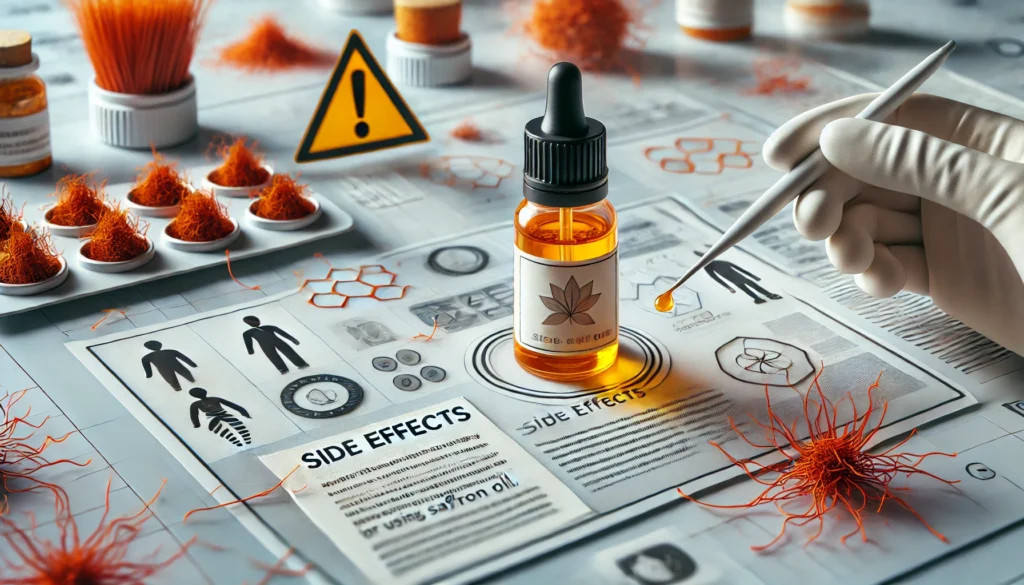
Though saffron oil can provide many health benefits, it is also essential to be aware of its potential side effects and take precautions when using this essential oil. Saffron oil is a solid natural remedy, so ensure it is utilized responsibly with precautions, especially oral ingestion or topical use without dilution.
Saffron oil overconsumption can cause side effects. Excessive consumption can cause dizziness, nausea, fussy eating, and other headache syndromes.
At higher doses or in more severe cases, poisoning can occur, and symptoms may include jaundice (yellowing of the skin and eyes), vomiting, and diarrhea. Maintain prescribed doses and be willing to consult a healthcare professional before increasing the dosage. Consuming large amounts of saffron oil can damage blood pressure and heart rate; this is why it should be taken very seriously by individuals already with heart conditions.
Drug Interactions
Certain medications that may interact with saffron oil should be a point of caution in any case, so it is unclear how definitive the Healthline claim can get. Saffron oil, for example, has a blood-thinning effect, which might enhance the effects of anticoagulants or warfarin (blood-thinning agents), which can increase risk factors related to bleeding.
Saffron oil can also influence serotonin levels in the brain, thereby possibly interacting with medications for depression or anxiety (including selective serotonin reuptake inhibitors [SSRIs]). For people taking medicine to treat chronic conditions (whether mental health, heart disease, or blood pressure), you should consult your doctor before using saffron oil. It is essential when using it as a supplement or in medicinal doses.
Related Frequently Asked Questions About Saffron Oi
What are the essential health benefits of saffron oil?
Saffron oil has many health benefits, including benefits for skin health and mood, and may decrease the risk of chronic disease. It also supports immune system function, assuages stress, and helps with sleep. It can also be used topically on the skin to brighten, reduce inflammation, and help tame that mane, leaving hair longer!
How Can Use Saffron Oil In Skincare?
However, saffron oil needs to be applied to the skin with a carrier fragrance-free oil such as almond, jojoba, or argan oil. Add a few drops of saffron oil to the regular moisturizer or serum and apply it to the face and neck. It moisturizes the skin, reduces pigmentation, and fights aging. To treat blemishes or pigmented areas, use it undiluted and sparingly on the affected area.
Eat saffron oil, and if it can, then how much is the quantity correct?
Saffron oil can be consumed repeatedly, only after consulting a health care specialist. Because the oil only drops a few drops, it is usually necessary. We take 1-3 drops daily and mix them with beverages such as tea or warm milk.
Saffronquite oil supports good mood, healthy digestion, and general well-being. However, if taken in more than the recommended dose, too much of an ingredient can cause adverse side effects like sickness or light-headedness.
Does saffron oil have any side effects?
Saffron oil is safe to use in moderation, but if taken too much or incorrectly, it can cause side effects. Internally, excessive consumption of saffron oil may induce nausea and vomiting, as well as dizziness. Meanwhile, more severe symptoms, like blood pressure changes, occur rarely.
Topically undiluted saffron oil can lead to skin irritation or sensitivity, especially in sensitive skin. Make sure to patch test before using saffron oil on significant parts of the skin.
Saffron oil used during pregnancy?
Saffron oil should be unsafe for pregnant women. Though saffron is safe when used in small quantities through food, a more potent version — called concentrated saffron oil— may have different impacts. Not to ingest () during pregnancy, pregnant women should consult a doctor.
Finished high concentrations of safflower oil can cause the uterus and, in turn, affect fetus development, leading to miscarriage. Using a diluted version on the skin is less likely to cause harm, but you should still consult with a healthcare provider beforehand.
In essence, saffron oil enhances mood and mental health.
According to previous literature, natural remedy in vitro and in vivo model systems (16) have shown their function on mood improvement along with decreased symptoms of anxiety and depression.
Studies have shown that saffron helps control serotonin levels in our brain and thus helps us feel happy, calm, and emotionally well-being. In aromatherapy, saffron oil may be diluted and applied to the skin. It has calming effects that help alleviate stress, improve mood swings, and produce more restful sleep. This soothing quality makes it a standard natural treatment for anxiety of mild to moderate severity.
Does Saffron Oil Help With Hair Growth?
Many know that saffron oil promotes hair growth and better scalp health. It is also applied to the scalp to repair and nurture hair follicles, strengthen roots, and help eliminate baldness. Its anti-inflammatory effects can even help soothe the scalp and decrease dandruff.
For better results, saffron oil should be mixed with a carrier like coconut or olive oil and then applied to the scalp. Applying it to the hair for 30 minutes before washing helps to get smooth and beautiful textured hair.
What Is The Best Saffron Oil To Buy?
Specialty health stores and some online retailers purchase high-quality saffron oil from certain cosmetic or wellness boutiques. When they want to buy saffron oil, they should be sure it is 100% pure and natural, free of synthetic chemicals or fragrances.
The sourcing of saffron comes from countries like Iran (∼90% according to Nafar and Ghaedi 2004), Spain, or India land (Alsabahi et al. Make sure to read customer reviews and verify with certifications before buying.
STORAGEShould saffron oil be?
To get the maximum benefits from saffron oil, store it in a cool, dark place away from direct sunlight or heat sources. To keep it fresh, store the bottle in an airtight, amber-colored glass container. If stored correctly, saffron oil lasts about two years after the first year.
Conclusion
Saffron oil is an incredibly versatile natural product. Between its powerful antioxidants that combat free radicals and reduce inflammation and its mood-boosting capability and properties for clearer skin or thicker hair, this oil is a healthful miracle in internal and external applications. In conclusion, whether saffron oil is a supplement for holistic health or topically to aid in beauty, Saffron-based oils are one of the new players on the field when it comes to easing physical/mental pain and making sure that it gets proper benefits from the wellness lifestyle upgrade.
How Saffron Oil From In Part Ofthe Everyday Skin Careificance of Adding Saffon To Daily Hair iswebElementXpaths Essential
Because of its versatility and abundance, it is easier than ever to include in the diet and beauty products expected from Saffron oil. These would be a beautiful addition to morning tea or nighttime skincare routine. They need a mood elevator, healthy glowing skin, and strong hair; saffron oil is an easy option for a natural, luxurious product. It has powerful healing benefits and must
everyone who wants to live a healthier lifestyle. Whether topically or aromatically, simply incorporating saffron oil into the lifestyle will offer long-term benefits from this golden elixir.

